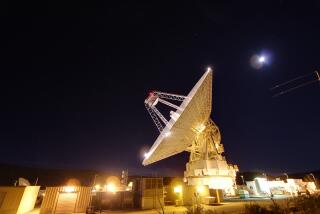GAO Says Questions Threaten Bush’s Timetable on ‘Star Wars’
- Share via
WASHINGTON — The costly effort to develop a space-based missile defense is beset by so much scientific uncertainty that President Bush should not decide during his current term in office to proceed with its deployment, an independent congressional study says.
The General Accounting Office concluded after an 11-month study that several barriers will prevent “Star Wars” managers from giving competent technical advice on deployment to Bush by early 1993, as he has sought. It said this will make a decision to proceed “premature and fraught with high risk.”
Managers “may be able to justify a decision to delay or cancel phase 1” of the strategic defense system by early 1993, said the GAO report. However, it said, they “will not be able to support an informed decision to deploy it” because of a recent redesign of the “Star Wars” system, insufficient testing and evaluation, and inadequate congressional funding.
Project officials said they could not comment on the report because they had not obtained a copy.
The GAO report suggests that by scaling the system back earlier this year in an effort to cut costs and simplify development, the government has introduced new complications and uncertainties that cannot be resolved for at least four years.
In January a new plan was selected to orbit thousands of small, autonomous rockets, known as “Brilliant Pebbles,” to sense and try to hit a fraction of Soviet nuclear-armed missiles in flight before they reach U.S. territory. An earlier plan would have orbited rockets in large “garages” to attack Soviet missiles with assistance from sensors on separate satellites.
None of the weapon elements needed for the new scheme, which the Pentagon says will cost at least $44 billion, has been “solidified,” the report said.
More to Read
Sign up for Essential California
The most important California stories and recommendations in your inbox every morning.
You may occasionally receive promotional content from the Los Angeles Times.













